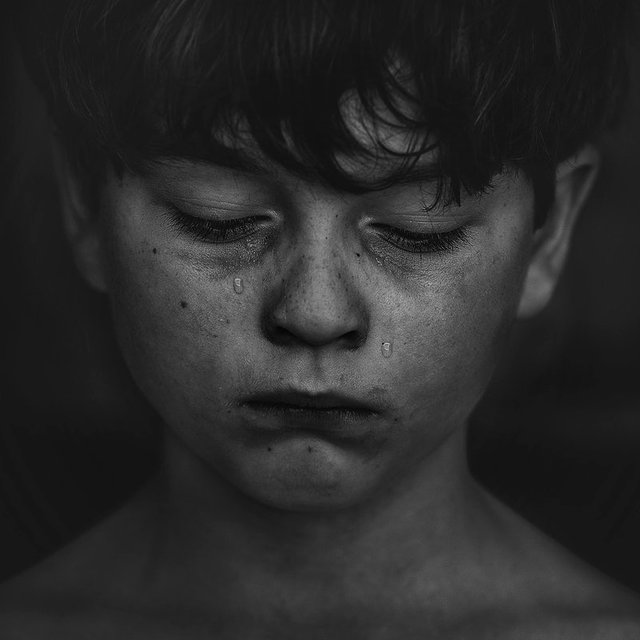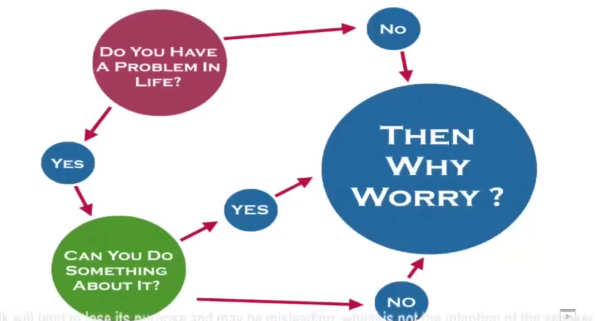Big Boys Don't Cry: Emotional First-Aid and Gender Roles
The way we teach children to deal with emotions is historically gender biased. While the lack of education for emotional hygiene and emotional first aid are global issues apparent all around us, I would like to focus on the gender gap in what I like to call "emotional education".
This article was inspired by a TED talk by Dr. Guy Winch titled "Why we all need to practice emotional first aid". I will try to cover the major points related to the topic at hand, but I strongly recommend you watch the TED - it's totally worth 17 minutes of your day.
Before I even start, I would like to note that there are a lot of generalizations in this article. I hate all generalizations (pun intended), but they're sometimes necessary to represent a prevalent situation or tendancy that one can define, perhaps, as the average or the so-called "norm". So when I say "girls" or "boys", assume I am discussing the cultural norms for the gender traits boys and girls should have.
Another disclaimer worth including is that while this article is tagged with "education" and "parenting" - I have no experience in neither. I do, however, plan to be a parent and so thinking (and writing) about these topics is something I see as preliminary research.
Why We Neglect Our Minds
In his TED talk, Dr. Winch expresses his disappointment with the favoritism we show our body over the mind. We learn from a very young age how to treat physical injuries and how to maintain physical hygiene to stay healthy. But we do not learn how to treat emotional injuries like failure or rejection, on even how to be aware of them. He does not, however, address the question why.
Unlike most physical trauma, emotional trauma is harder to diagnose and treat. You can see a broken limb, but it's much harder to see a broken heart. So even though repeated emotional trauma can be lethal, we prefer to ignore it because it's harder to spot.
Beyond the challenge of detection and treatment, emotional trauma has its stigma. People who admit to being hurt or lonely are seen as weak, so many prefer to try and bury their emotions, letting the trauma fester. I argue that this social favoritism of physical health over emotional hurts boys and men differently than it does girls and women, and it is one of the causes for higher rates of violence in men.
We sustain psychological injuries even more often than we do physical ones, injuries like failure or rejection or loneliness. And they can also get worse if we ignore them, and they can impact our lives in dramatic ways. And yet, even though there are scientifically proven techniques we could use to treat these kinds of psychological injuries, we don't. It doesn't even occur to us that we should. "Oh, you're feeling depressed? Just shake it off; it's all in your head." Can you imagine saying that to somebody with a broken leg: "Oh, just walk it off; it's all in your leg." - Dr. Guy Winch
Dirty Minds of Dirty Boys
On average (here come those generalizations), girls are brought up to have better physical hygiene than boys. This is especially prevalent as toddlers become children, and it stops being culturally acceptable for girls to climb trees or play in the mud. I think that in many ways, this is also true for emotional hygiene, and how the environment teaches it to children of different genders.
Experiments (citation needed) have shown that adults tend to categorize the emotions and desires of toddlers according to their (perceived) gender. So a crying toddler will be "angry" to those who think he is a boy, and "sad" to those who think she is a girl. This biased perception continues with us as we age, and the world treats us differently according to our genitalia - boys are supposed to be emotionally resilient and show little to no emotion, while girls are expected to be emotional but also submissive.
When it comes to the acknowledgement and recognition of emotions, boys have pulled the short stick. Given very few tools to understand and treat their emotional traumas, they are left to carry the burden and repress their feelings, adding scar atop emotional scar.
But it's not like girls are encouraged to accept and understand their emotions, or given tools to deal with trauma like rejection, failure or loneliness. They're told it's okay to be emotional, and even use it as an advantage and tool to control the opposite sex. Since boys are equipped with even fewer tools and strategies to recognize and deal with emotions, they often fear the emotions of girls. And as we grow up, this perception of emotional gender roles creates a distance between men and women that is damaging to us as a society.
Does Loneliness Kill Men More?
One of the most damaging prolong traumas can be loneliness. It can kill you, or at least increases your chances of dying young. Females have a biological tendency to be more social (citation needed) as so naturally suffer less from loneliness. Males seek to belong to a pack, but are also encouraged to be competitive and self-reliant.
While our culture idealizes the image of the self-sufficient "Lone Wolf", no one bothers telling boys that it's okay to feel emotionally disconnected, and it's okay to need and desire support and empathy. Expecting boys to manage loneliness is absurd, especially if you consider that most adults of either gender aren't particularly good at it.
Dealing with Failure & Rejection
We humans like to seek out fault. We want to understand why something didn't work out as planned, and we want someone to blame. I don't recall having read studies on the subject, but from my observation I see a certain emotional directionality when it comes to dealing with emotional trauma.
When faced with failure and rejection, men will more often turn their emotions outwards, seeking out blame and responsibility to place elsewhere. The more "feminine" approach turns the emotions inward, judging one's own abilities and doubting oneself. This directionality may cause girls to become more self-critical and be more avoidant of situations where they can fail. Boys, on the other hand, take less of a blow to their self-esteem (on average) and so they continue to try and succeed.
How does society encourage boys to try more, while girls are driven to be more self-doubt? I am not sure, but that's what the comment section is for. Tell me what you think!
-=-=-=-
Illustrations via Unsplash
BONUS! Read so far? Leave an insightful comment and/or link one of the citations needed for a generous upvote on your comment.
-=-=-=-




YES! Being aware of this will make you a GREAT parent. We will never be raising our kids without fault (letting your kids 'go' into society will also mean you have to correct some societal mistakes unfortunately :-/) but we can honor our future artists, presidents, and everything in between better by raising them without all the boxes you can put a child in.
Learning about emotional health is step 1 in that. Where physical wounds are either immediately treated 'right' or just heal without even taking an effort, this is not the case for emotional health. We have to teach our kids to take a look at their emotions and express them in a way that fits the child instead of what fits in society. There are some lovely exercises to do with a child, like: how do you walk when you are mad? (Some start walking faster, some start kicking things, other will not walk but go sit in a corner when they're mad), and explain that that's interesting, and also show how you walk when you are mad, and just talk about different ways of expressing anything.
You will like (if you haven't seen it yet) this TED talk too as a future parent by the way: https://www.ted.com/talks/caroline_paul_to_raise_brave_girls_encourage_adventure - Girls are kept from 'dangerous' play situations where boys get compliments for it. That's one example of how we encourage different outward/inward behavior between the sexes, but there are many more.
Thanks for writing about this topic on Steemit :-)
PS: There are biological differences between the two genders. From a chromosomal standpoint, boys have a higher change of behavioral (outward acting) disorders, where girls have a higher change if hormonal (inward feeling) disorders. But this only in part explains the differences we see in children. There's always nature/nurture, and there are many examples of how people change their behavior towards a child if they believe a child is from 'the opposite sex' (by changing a girl from a pink in a blue outfit for example).
If I find these experiments I'll drop them here too :-)
This is one of the best posts I've read so far on Steemit. As a mother of an almost 4 year old It affects me a lot. It's really hard to go against society. Even if you give your best in raising them, what they see in school and everywhere else affects their perception. For example, I've never been so "pink is for girls, and blue is for boys" but my son cries when someone gives him something pink complaining that pink is only for girls. That is something he got from somewhere else. Didn't really think about it in an emotional perspective. Emotional intelligence is so important specially for toddlers. Every time my son gets upset, I tell him it ok to get mad, what is not ok is to hurt others or to stay stuck in that emotion, we are humans, it's ok to go through all the emotions, but we need to learn to let go and continue.
Wow. This whole article is excellent. The TED talk resonates especially because I have twin boys. They're 3, and emotional intelligence and resilliance is a priority for me. We also try to have toys typically given to either gender. (Okay, they don't have barbie dolls, but they love their kitchen and their stuffies, including the pink mermaid and purple unicorn.) There are no guns in their collection of toys, and I don't allow them to watch anything violent. It actually shocks me how "normal" violence and guns are, at very young ages, and how glorified it is.
Can we please stop normalizing war and killing, and instead normalize being compassionate human beings?
My experience with loneliness and self-doubt has been difficult my whole life. Changing my self-talk has been a multi-decade-long project, and I still struggle with rumination of events as early as age 5. Depression and anxiety have been challenges for me all my life, but with yoga, nature, and being persistent with positive thinking (and also letting myself feel deeply, letting emotions move), these issues are managed. Finding community and remembering I'm not alone has been a huge help with this as well.
I could go on, but I won't. Instead I'll thank you for this article. It's extremely important, and affects all of us.
I haven't had kids of my own but I have spent a lot of time working with children and biology does have a strong influence. While these are generalisations, female brains mature emotionally much faster than male brains. Girls do learn to be quiet and focus on tasks earlier than boys do and I think society and teachers harness that, if only to get things done or some semblance of order out of chaotic kids. We often have to tell little boys that "big boys don't cry" because they frequently do cry and act out so much more than girls because they have a harder time containing their emotions at a comparative age than girls do. Boys are generally about 2 years behind girls in emotional brain development and it's wise to bear that in mind when trying to teach kids.
What bothers me is the societal construct of boys being taught that they are superior to girls and the natural inheritors of the earth, despite the fact that they frequently behave so badly. At puberty, it is true that female behaviour and skills can be very strongly influenced by hormones. For instance, prepubertal girls are very much boys' equals in science and mathematics but after puberty, many boys outstrip girls. Does this mean that all girls are crazy and irrational, as society likes to think? No, but there is an added hormonal emotional dimension to the female experience.
Boys on the other hand, tend to get into high-risk activities under the influence of testosterone. Society attempts to harness that testoterone by encouraging boys to win, often at all costs.
I believe that there are different mental abilities that do fall into general categories but it is a mistake to pigeonhole kids. I also think it is true that some men are more in touch with their emotions than others and it does depend on whether they were handled skillfully or brutally by parents and educators. The same goes for women when it comes to whether they accept traditional gender roles, at the expense of stifling their own intellect.
Society is a construct that humans use in order to live together. As such, the roles assigned always depend on the tasks of the time. It can only ever be a blunt instrument.
I totally agree with Winch's disappointment with the favoritism we show our body over the mind. We treat our mind almost exclusively when we get really bad (get a prominent mental illness), instead of practicing positive psychology on a regular basis (maintaining emotional hygiene, as you said).
Here's a very interesting article by @abigail-dantes about mindfulness, which is one of the basis of positive psychology.
A very interesting info, didn't know this! So far I've read only your Mistress of Magic articles, but I love the way you wrote this "research" of yours. I'm looking forward for more! : )
Really great post, this is something that really needs to be talked about and explored.
For me these gender roles are part of the patriarchal society we are oppressed by. It really is all about trying to detach boys away from there emotions so that they are seen as stronger and more powerful. Constantly told to be a man and toughen up. It has been going on a very long time and has somewhat been accepted as the way it is meant to be. Boys/men are not meant to be seen as emotional beings and this is so very wrong, there is so little in the way of promoting emotional well being for boys and men. That whole idea of them being weak if they are seen crying, yet when they show any strength it is only the physical type that is encouraged.
But awareness is happening (about time too) having this discussion, reading your great post is all a step in the right direction.
Within the patriarchal society when women doubt themselves they do not step into their full power, making them easier to control. Thank you for writing about this, it is so needed and such a good sign that change is starting to happen.
I think you're very right. Girls and boys (as women and men) are being treated differently by society, as well as by themselves as a result of their own education. This is something that is very clear since before the baby is even born - looking at equipment, clothes, toys, accessories for babies, you definitely see the different themes - colors, drawings, everything.
As the babies start growing, you see that boys are treated differently by their parents - for them it's okay to run around, mess around, make lots of noise, and sometimes push or beat up other children (no, it's never okay, but some parents seem to be more receptive for such things, for some reason).
I think that the way to change these attitudes starts with the parents. As a parent to a 3yo daughter, I can definitely say she's less shy and "girly-like" than most girls I see that age. That said, we do keep strict boundaries on what can and cannot be done - the same boundaries we'd put for a boy. She has various sorts of toys - cars, dolls, airplanes, dress-up costumes, and she plays with all of them, because she doesn't know that she's "supposed to" play with certain things and not with others. And she's a great soccer player, too. And a daredevil acrobat.
Society is us. If we change the way we look at "boys vs. girls", both in terms of physical appearance and mental expressions (cry, talk, etc.), we can change the world. But it takes time and effort. Tons of effort.
I enjoyed reading your post and watching the lecture.
By the way, Guy mentioned distraction as a tool to fight negative thoughts.
I wonder if there is a gender difference in the ability to create a distraction when one is in the mood for negative thoughts?
another tool that I think can be useful as emotional hygiene is this slide which represent a simple but positive way of thinking (watch the short video too).

Emotional education as what you highlighted on the 1st paragraph on this article is definitely an eye opener for me. It is true that people nowadays are neglecting the importance of our emotional aspects. Emotional injuries as what Dr. Winch expressed in his talk is difficult to treat or even heal. Aside from developing our brains to become wiser and smarter we should also give attention in emotional intelligence as well. All of these could result in preventing labels on our kids. Gender differences should be given importance so as emotional knowledge. Correcting unrealistic standards of society should also be given emphasis. Great article @techslut , glad I pressed the upvote and follow button. This is definitely an excellent article.